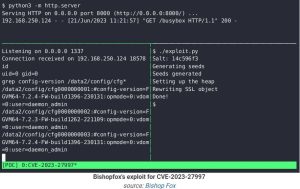Hundreds of thousands of FortiGate firewalls are vulnerable to a critical security issue identified as CVE-2023-27997, almost a month after Fortinet released an update that addresses the problem.
The vulnerability is a remote code execution with a severity score of 9.8 out of 10 resulting from a heap-based buffer overflow problem in FortiOS, the operating system that connects all Fortinet networking components to integrate them in the vendor’s Security Fabric platform.
By infosecbulletin
/ Saturday , July 27 2024
Risk of cyber attack, the country's main stock market Dhaka Stock Exchange (DSE) and Chittagong stock exchange (CSE) website is...
Read More
By infosecbulletin
/ Saturday , July 27 2024
Google fixed a bug in Chrome's Password Manager that caused user credentials to vanish temporarily. A problem with Google Chrome's...
Read More
By infosecbulletin
/ Saturday , July 27 2024
India’s Communications Minister Chandra Sekhar Pemmasani confirmed a breach at the state-owned telecom operator BSNL on May 20 during a...
Read More
By infosecbulletin
/ Saturday , July 27 2024
Malware based threats increased by 30% in the first half of 2024 compared to the same period in 2023, according...
Read More
By infosecbulletin
/ Friday , July 26 2024
A new critical vulnerability in the Domain Name System (DNS) has been found. This vulnerability allows a specialized attack called...
Read More
By infosecbulletin
/ Friday , July 26 2024
A serious vulnerability, CVE-2023-45249 (CVSS 9.8), has been found in Acronis Cyber Infrastructure (ACI), a widely used software-defined infrastructure solution...
Read More
By infosecbulletin
/ Friday , July 26 2024
OpenAI is testing a new search engine "SearchGPT" using generative artificial intelligence to challenge Google's dominance in the online search...
Read More
By infosecbulletin
/ Thursday , July 25 2024
CISA released two advisories about security issues for Industrial Control Systems (ICS) on July 25, 2024. These advisories offer important...
Read More
By infosecbulletin
/ Thursday , July 25 2024
Tenable security researchers found a vulnerability in Google Cloud Platform's Cloud Functions service that could allow an attacker to access...
Read More
By infosecbulletin
/ Thursday , July 25 2024
BDG e-GOV CIRT's Cyber Threat Intelligence Unit has noticed a concerning increase in cyber-attacks against web applications and database servers...
Read More
CVE-2023-27997 is exploitable and allows an unauthenticated attacker to execute code remotely on vulnerable devices with the SSL VPN interface exposed on the web. In an advisory in mid-June, the vendor warned that the issue
may have been exploited in attacks.
Fortinet addressed the vulnerability on June 11 before disclosing it publicly, by releasing FortiOS firmware versions 6.0.17, 6.2.15, 6.4.13, 7.0.12, and 7.2.5.
ALSO READ:
Daily Cybersecurity update, July-03, 2023
Offensive security solutions company Bishop Fox reported on Friday that despite the calls to patch, more than 300,000 FortiGate firewall appliances are still vulnerable to attacks and reachable over the public internet.
Bishop Fox researchers used the Shodan search engine to find devices that responded in a way that indicated an exposed SSL VPN interface. They achieved this by searching for appliances that returned a specific HTTP response header.
They filtered the results to those that redirected to ‘/remote/login,’ a clear indication of an exposed SSL VPN interface.

The query above showed 489,337 devices but not all of them were vulnerable to CVE-2023-27997, also referred to as Xortigate. Investigating further, the researchers discovered that 153,414 of the discovered appliances had been updated to a safe FortiOS version.

This means that roughly 335,900 of the FortiGate firewalls reachable over the web are vulnerable to attacks, a number that is significantly higher than the 250,000 recent estimation based on other, less accurate queries, Bishop Fox researchers say.
Another discovery Bishop Fox researchers made was that many of the exposed FortiGate devices did not receive an update for the past eight years, some of them running FortiOS 6, which reached end of support last year on September 29.
These devices are vulnerable to several critical-severity flaws that have proof-of-concept exploit code publicly available.
To demonstrate that CVE-2023-27997 can be used to execute code remotely on vulnerable devices, Bishop Fox created an exploit that allows “smashes the heap, connects back to an attacker-controlled server, downloads a BusyBox binary, and opens an interactive shell.”
“This exploit very closely follows the steps detailed in the original blog post by Lexfo […] and runs in approximately one second, which is significantly faster than the demo video on a 64-bit device shown by Lexfo,” Bishop Fox notes in their
report.
Source: Bleepingcomputer



 InfoSecBulletin Cybersecurity for mankind
InfoSecBulletin Cybersecurity for mankind















